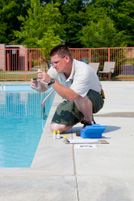Why Your Pool Maintenance Should Include Monitoring Chemicals

Swimming pools provide a lot of enjoyment in the summer, but without the proper pool maintenance, the water can become full of unwanted debris, plant life, and bacteria. An important maintenance task involves monitoring your pool’s chemicals. The right pool chemistry supports a clean and safe environment in which you can swim, play, and relax on a hot day.
The Importance of Maintaining Pool Chemicals
How Chemicals Help
The sun, natural debris, people, animals, bacteria, and rain can all affect the chemistry of pool water, throwing it off balance and making it unsafe. Specially formulated pool chemicals break down oils and other contamination within the water, removing what shouldn’t be there so it doesn’t irritate your skin, harm your eyes, or clog your pool’s filters. Chemicals such as chlorine and pH balancers must be tested regularly to make sure pool water is safe to swim in.
Which Chemicals Are Necessary
 Most pool owners know that chlorine—which kills microorganisms, bacteria, and algae—is an essential part of pool maintenance, but other chemicals are needed, too. Cyanuric acid is a stabilizing agent that protects chlorine from damage caused by the sun.
Most pool owners know that chlorine—which kills microorganisms, bacteria, and algae—is an essential part of pool maintenance, but other chemicals are needed, too. Cyanuric acid is a stabilizing agent that protects chlorine from damage caused by the sun.
Your pool will also need an oxidizer every few weeks to help kill algae and bacteria. Water balancers are necessary to prevent calcium hardening and prevent water from becoming too acidic. Additional chemicals are available to help combat problems as they arise, such as algae or odors.
For more than 50 years, B & H Pool & Patio in High Point, NC, has helped residents in the Triad area install and maintain their above- and in-ground swimming pools. The experienced staff can test the chemicals in your pool and make sure the water is balanced as part of an exacting pool maintenance program. Call (336) 841-3222 or visit their website to learn more about their pool services today.
About the Business
Have a question? Ask the experts!
Send your question

